Rangoon College was established in 1878 under Calcutta University, which was later named Government College in 1906. Physics Department was established in early 1920 under Meteorology Department in University College with Physics Department itself established in 1924. Dr Maung Maung Kha took the helm in 1947 as the first national professor of Physics at Yangon University.
The department offers the courses granting such degrees as BSc, BSc Honours, DAP (Diploma in Applied Physics), MSc, MRes (2002-2018), MEP (Master of Engineering Physics) and PhD (1994-present). The MSc programs deals with the specific areas: Electronics Physics and Nuclear Physics whilst the PhD programs were approved in 1994 with the specializations in Theoretical Physics, Nuclear Physics, Electronics and Materials Science.
The aim of the Honours course is to provide a thorough education in Physics and Nuclear Physics, and a basic training for anyone wishing to make a career as a scientist or technologist in industry, pure research, teaching and related fields. The course as designed is oriented towards applied aspects of Physics. Students are offered the electronics and nuclear physics modules as the third levels. The Electromagnetic Field Theory and Laser Physics Module are also available in the Second Year Honours course and First Year MSc Nuclear Physics courses. The Laboratory Computational Physics Course is also available in the Second Year. Students are encouraged to relate Physics to other branches of science so that science is not seen as divided isolated compartments.
The Courses We Offer
The department offers the courses granting such degrees as BSc, BSc Honours, DAP (Diploma in Applied Physics), MSc, MRes (2002-2018), MEP (Master of Engineering Physics) and PhD.
Degree Descriptions
The aims of the courses are to provide thorough knowledge and competencies in various branches of physics through our basic and advanced activities of training to anyone determined to make a career as a technologist or a researcher in the industrial and educational sectors. The courses are designed and run in the applied and theoretical aspects of physics with all the programs enabling the students to acquire knowledge, conceptual understanding and creativity and simultaneously making the students able to broaden their problem-solving skills not only in physics but also in the other contexts of science.
The objectives of the current courses are to assist the students to understand the interdependence between science and society. Furthermore, the courses can also help the students become aware of the local and the global dimension of science with reference to the relevant social, environmental and cultural factors.
Degree Descriptions

Materials Science Lab
• Thin Film Solar cell Fabrication
• Organic Photovoltaic Cell
• Organic Inorganic Perovskite Solar Cell
• Ferroelectric Thin Film Memory Device Fabrication
• Ferroelectric Ceramic Designs
• Biomass and Biochar
• Graphene Oxide and Conductive Graphene Layer
• Nanoparticles, Nanofibre, Nano-rod, Nano wire Fabrication
• Potential Induced Degradation (PID) and Recovery of Solar Panel based on Climate Change
• Fabrication of DSSC with Natural Dye Sensitizers (Including Myanmar Algae)
• Solid Oxide Fuel Cell with Agricultural Wastes
• Electrochromic Fabrication
• Agricultural Waste for Cement Replacement
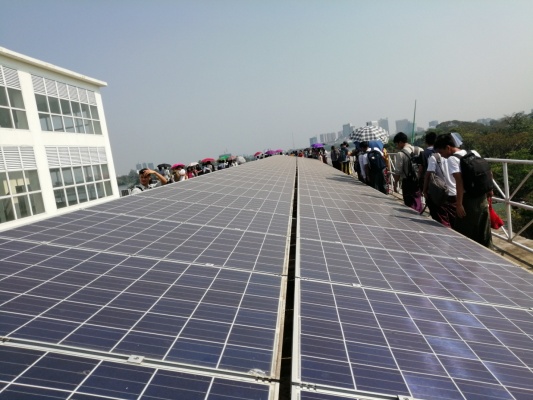
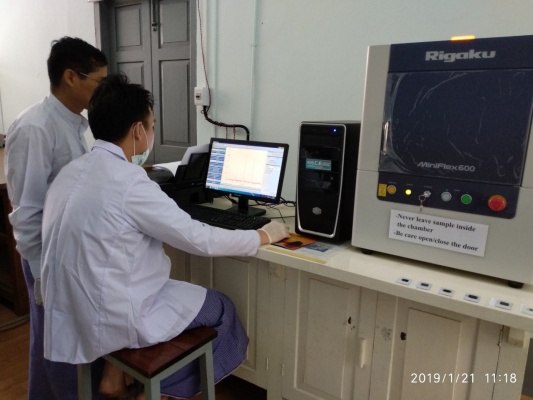
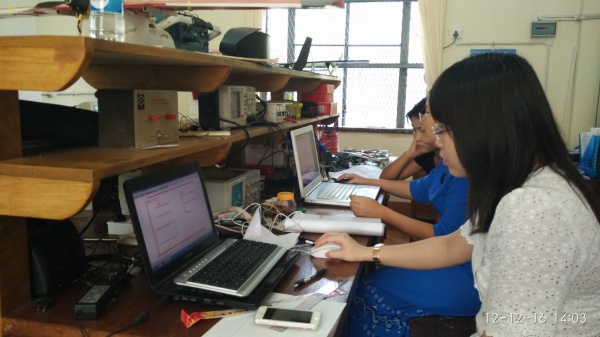
Electronics
• Embedded System: Design and Applications
• Automation of unmanned vehicles
• Image processing
• Sensor (fabrication and prototyping)
• Nonlinear Kalman filters for sensor fusion
• Artificial Intelligence (AI)
• Nanoelectronics
Nuclear Physics
• Monitoring of Radon Concentration Research in Myanmar
• Neutron Activation Analysis
• Radiation Protection and Shielding
• Modeling of Nuclear Data Research
• Food Irradiation
• Monitoring and Determination of Nuclear Radioactive Behavior in Air, Soil, Water, Rock and Minerals
• Radiation Hazard and Health Physics
Environmental Physics
• Water Quality Analysis by Nanotechnology
• Meteorological and Hydrological Researches
• Renewable Energy
• Climate Change, Monitoring & Disaster Management
1. Material Engineering
2. Electrical and Electronics Engineering
3. Nuclear Physics
4. Energy Engineering
5. Theoretical and Computational Physics
6. Signal and Image Processing Engineering (Information Technology)
7. Optics and Photonics
| Sr No. | University/ Institution/Organization | Collaboration / Program |
|---|---|---|
| 1 | Josai University, Japan | (1) Lectures Series on 5S Kaizen & Management (2) Job Fair Program (3) Staff Exchange Program (4) Student Exchange Program |
| 2 | Gifu University, Japan | (1) Staff Exchange Program |
| 3 | Australian National University (ANU), Australia | (1) Training on Experimental Physics (2) Staff Exchange Program |
| 4 | Tampere University, Turku University Finland | Development of Energy Education in Mekong Area (Erasmus + DEEM project) |
| 5 | Europa-Universitat Flensburg, Germany | Development of Energy Education in Mekong Area (Erasmus + DEEM project) |
| 6 | Wageningen University, Netherlands |
Development of Energy Education in Mekong Area (Erasmus + DEEM project) |
| 7 | Finland Future Research Center (FFRC) Finland |
Development of Energy Education in Mekong Area (Erasmus + DEEM project) |
| 8 | Royal University of Phnom Penh (RUPP), Cambodia | Development of Energy Education in Mekong Area (Erasmus + DEEM project) |
| 9 | Institute of Technology of Cambodia (ITC), Cambodia | Development of Energy Education in Mekong Area (Erasmus + DEEM project) |
| 10 | National University of Laos, Laos | Development of Energy Education in Mekong Area (Erasmus + DEEM project) |
| 11 | Kasetsart University, Thailand | (1) Joint Research Project for PhD & MSc |
| 12 | Universitat Konstanz, Germany | (1) Scholar Exchange for MSc (2) Staff Exchange Program |
| 13 | Nanyang Technological University (NTU), Singapore | (1) Staff Exchange Program (2) Student Exchange Program |
| 14 | University of Applied Sciences Jena, Germany | (1) Future Collaboration of Instrumentation& Materials Physics |
| 15 | Louisiana State University, America | (1) Geophysics & Water Study Research |
| 16 | Toyohashi University of Technology, Japan | (1) Doctoral Degree Program |
| 17 | Tokyo Institute of Technology, Japan | (1) Doctoral Degree Program |
| 18 | University of Tokyo, Japan | (1) Doctoral Degree Program |
| 19 | Kyushu University, Japan | (1) Doctoral Degree Program |
| 20 | Universiti Sains Malaysia, Malaysia | (1) PhD Sandwich Program |
| 21 | Chulalongkorn University, Thailand | (1) PhD Sandwich Program (2) Integrated Graduate Program |
| 22 | Korea Advanced Institute of Science and Technology, Korea | (1) Research Fellowship Program |
| 23 | Sakon Nakhon Rajabhat University, Thailand | (1) Joint Fellowship Program for Doctoral Studies |
| 24 | University of Santo Tomas, Philippines | (1) Share Scholarship Program |
| 25 | University of the Philippines, Philippines | (1) Share Scholarship Program |
| 26 | Hue University, Vietnam | (1) Share Scholarship Program |
| 27 | Ho Chi Minh University of Technology and Education, Vietnam | (1) Share Scholarship Program |
| 28 | Nara Institute of Science and Technology, Japan | (1) Joint Research Project for PhD & MSc |
| 29 | Korea Foundation For Advanced Studies | (1) Post Doctorate Fellowship Program (2) Research Granting |
| 30 | Hokkaido University, Japan | (1) PhD Program |
Dr Min Maung Maung Professor
Dr Cho Cho Thet Professor Dept of Physics
Dr Nyein Thida Professor
Dr Ohn Mar Swe Associate Professor
Dr Zin Mar Win Associate Professor
Dr Khine Khine Linn Associate Professor
Dr Aye Aye Swe Associate Professor
Dr Myo Myo Tun Associate Professor
Dr Chan Nyein Aung Associate Professor
Daw Phyu Phyu Win Lecturer
Dr Thet Thet Swe Lecturer
U Phyo Aung Lecturer
Dr May Kalayar Kyaing Lecturer
Dr Amy Aung Lecturer
Dr Oak Kar Shin Assistant Lecturer
| Academic authorities: | The Rector, Prorectors, Professors (Head of Department) |
| Academic calendar: | First Semester: From 1st December to End of March Second Semester: From 1st June to End of September |
University of Yangon uses CTS, the Credit Transfer System. Normally, 1 credit is equal to 15-24 hours worth of work for a theoretical Course (One credit in lecturing is one hour lecturing in a class a week a semester), Laboratory Course: a credit of laboratory is an experiment in laboratory, which has at least 2 hours a week a semester, Field work (for some exceptional subjects): a credit of field work is a training conducted in farms, companies or other places which has 2 hours a week a semester.
| UY Grading Scale | Qualitative definition | Marks Range | Letter Grade Assign | ECTS grade | US grade |
|---|---|---|---|---|---|
| 5 | Excellent | 75 & above | A | A | A+ |
| 4 | Very Good | 65-74 | B | B | A |
| 3 | Good | 50-64 | C | C | B |
| 2 | Satisfactory | 35-49 | D | D | C |
| 1 | Poor | 1-34 | E | E | D |
| 0 | Fail | 0 | F | F F/FX | F |
First Year BSc (Semester I)
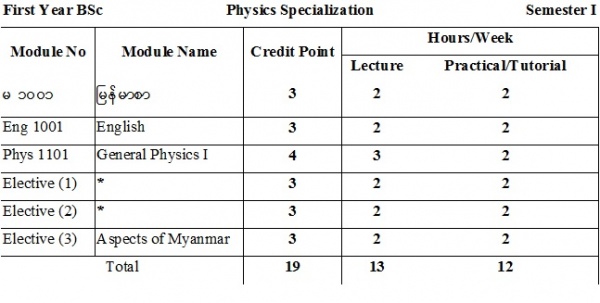
Total Credits – 19: Total hours –25
*A student can choose any threeelectives including those offered by the Department of Mathematics, Geology and Chemistry to fulfill total of 19 credit points. Counseling is advisable.
First Year BSc (Semester II)
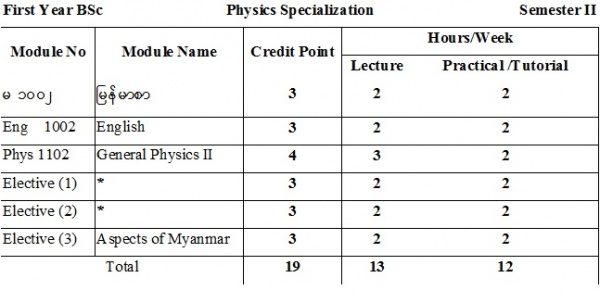
Total Credits – 19: Total hours – 25
A student can choose any threeelectives including those offered by the Department of Mathematics, Geology and Chemistry to fulfill total of 19 credit points. Counseling is advisable.
All students who wish to take Physics as a special or subsidiary subject must take Phys 1101/1001 and proceed to Phys 1102/1002. A total of 170 credit units must be required for a BSc Degree and a total of 218 credit units are required for an Honours Degree.
.
Second Year BSc (Semester I)
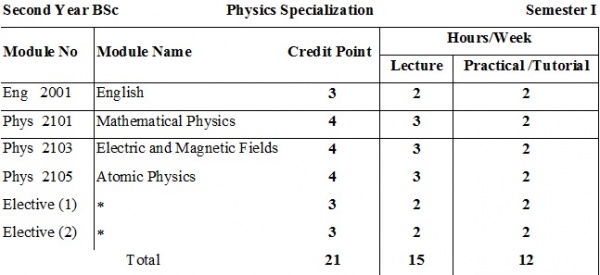
Total Credits – 21: Total hours – 27
*A student can choose any two electives offered from the Department of Mathematics and Physics to fulfill total of 21 credits. Phys 2107or Phys 2109 is assigned as Elective 1. Math 2001 is assigned as Elective 2.
Elective Course for Chemistry, Mathematics, Geology, Industrial Chemistry, Marine Science, GeographyStudents: Phys 2003 Electric and Magnetic Fields.
Second Year BSc(Semester II)
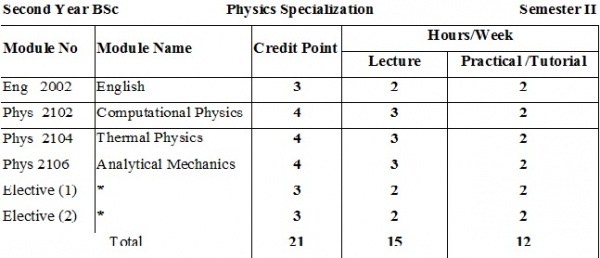
Total Credits – 21: Total hours – 27
*A student can choose any two electives offered from the Department of Mathematics and Physics to fulfill total of 21 credits. Phys 2108 or Phys 2110 is assigned as Elective 1. Math 2004 is assigned as Elective 2.
Third Year BSc (Semester I)
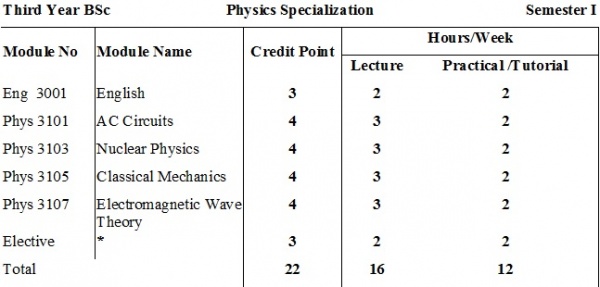
Total Credits – 22: Total hours – 28
*A student can choose any one elective offered from the Department of Mathematics and Physics to fulfill total of 22 credits. Phys 3109 orMath 3001 is assigned as Elective.
Third Year BSc (Semester II)

Total Credits – 22: Total hours – 28
*A student can choose any one elective offered from the Department of Mathematics and Physics to fulfill total of 22 credits. Phys 3110or Math 3002 is assigned as Elective.
Fourth Year BSc (Semester I)

Total Credits – 23: Total hours – 29
*A student can choose Physics to fulfill total of 23 credits.
Fourth Year BSc (Semester II)
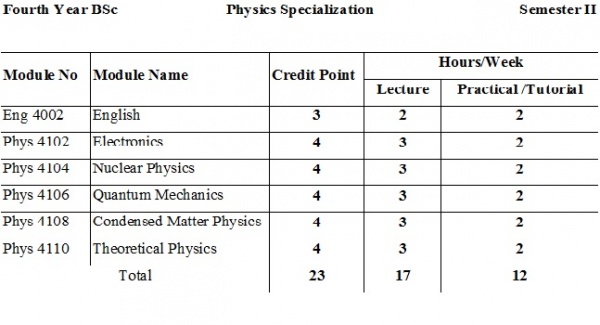
Total Credits – 23: Total hours – 29
*A student can choose Physics to fulfill total of 23 credits. Term/ Project paper must be submitted by each group not more than 10 students in Fourth Year Second Semester. Group paper presentation must be included.
First Year BSc Honours(Semester I)
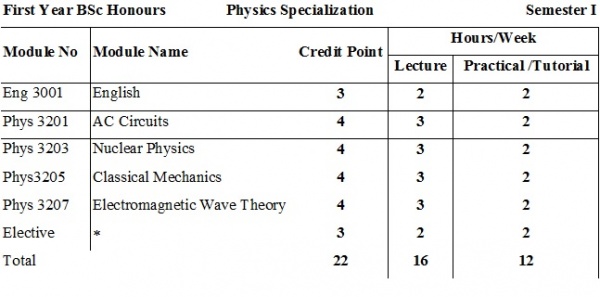
Total Credits – 22: Total hours – 28
*A student can choose any one elective offered from the Department of Mathematics and Physics to fulfill total of 22 credits. Phys 3209 or Math 3001 is assigned as elective.
First Year BSc Honours(Semester II)
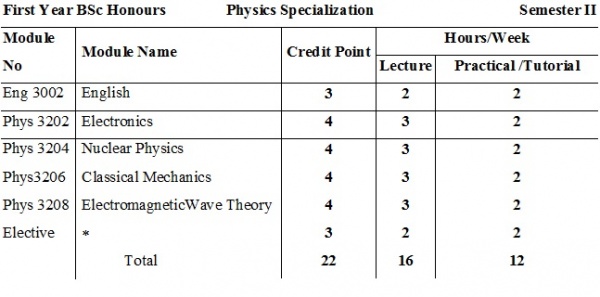
Total Credits – 22: Total hours – 28
*A student can choose any one elective offered from the Department of Mathematics and Physics to fulfill total of 22 credits. Phys 3210 or Math 3003 is assigned as elective .
Second Year BSc Honours(Semester I)
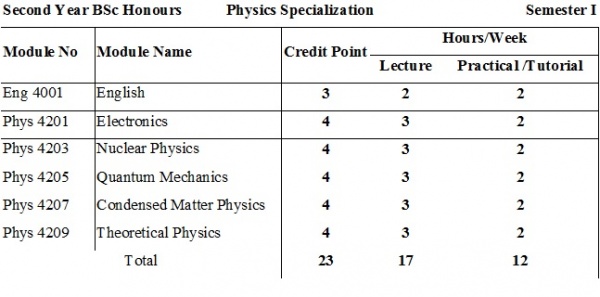
Total Credits – 23: Total hours – 29
*A student can choose Physics to fulfill total of 23 credits.
Second Year BSc Honours (Semester II)
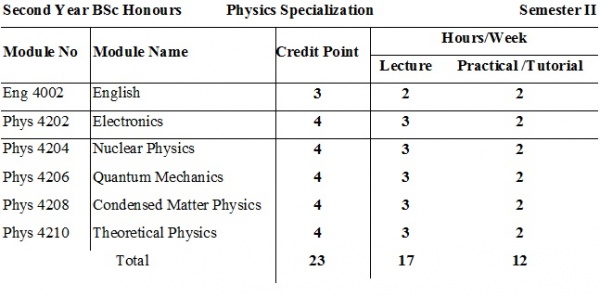
Total Credits – 23: Total hours – 29
*A student can choose Physics to fulfill total of 23 credits.
Third Yea BSc Honour (Semester I)
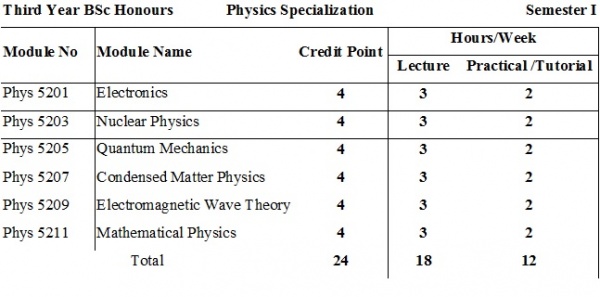
Total Credits – 24: Total hours – 30
*A student can choose Physics to fulfill total of 24 credits.
Third Yea BSc Honour (Semester II)
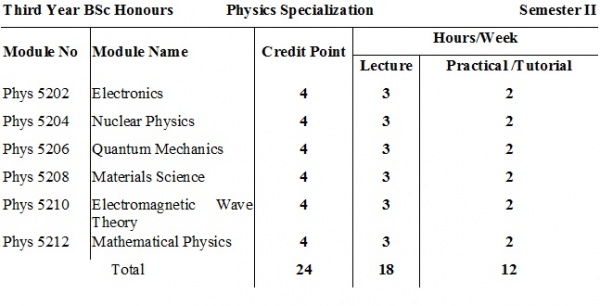
Total Credits – 24: Total hours – 30
*A student can choose Physics to fulfill total of 24 credits. Term/ Project paper must be submitted by each group not more than 10 students in Third Year Honours Second Semester. Group paper presentation must be included.
MSc Qualifying(Semester I)
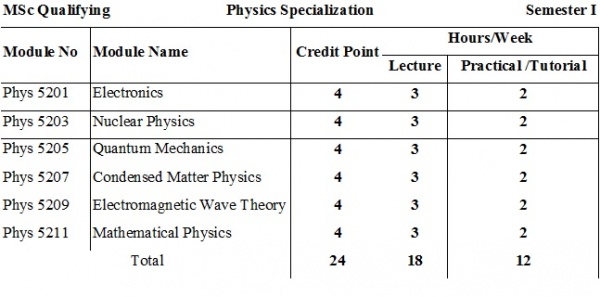
Total Credits – 24: Total hours – 30
MSc Qualifying(Semester II)
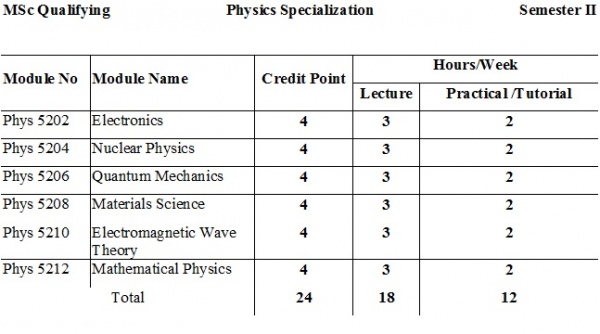
MSc First Year (Semester I)

MSc First Year (Semester II)
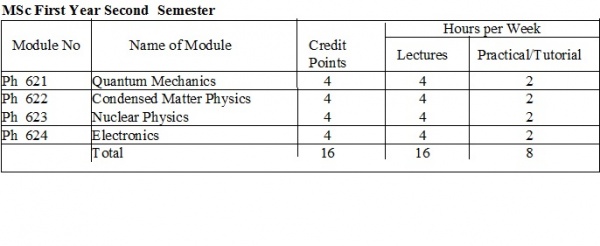
MSc Second Year (Semester I)

MSc Second Year (Semester II)
